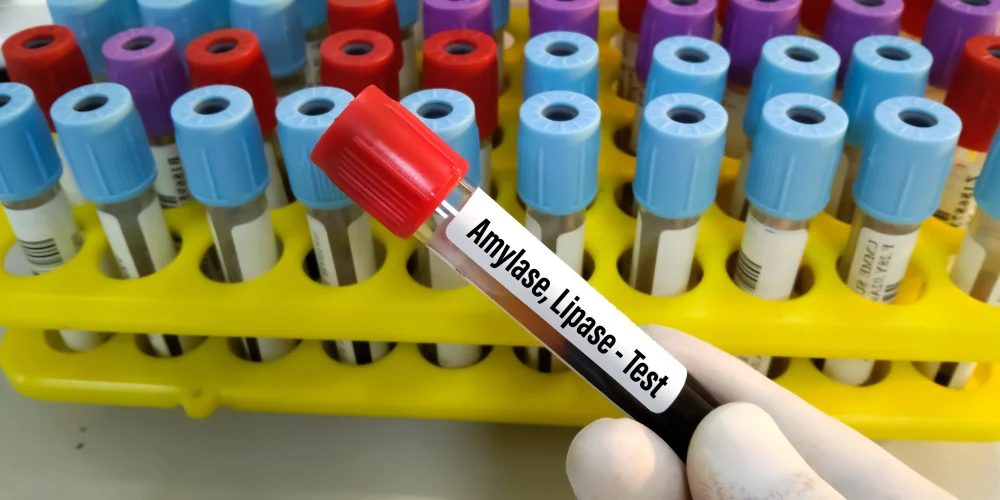Lipase Test
Assessment of Pancreatic Function
It has been considered to be an important test since it measures blood levels of an enzyme that is mainly produced by the pancreas and plays a key role in the digestion of dietary fats. It breaks them down into smaller portions digestible by the body. Any abnormal level of lipase may suggest several disorders of the pancreas or other gastrointestinal disorders. Lipase, therefore, constitutes an essential part of diagnostics for investigating the cause of pancreatitis, gallbladder disease, and a wide range of digestive problems. Periodic tests or early detection through the Lipase Test guarantee efficient treatment for the patient with pancreatic disorders.

When is the Lipase Test Required?
For Pancreatic Inflammation : Lipase Test is usually recommended when a doctor suspects pancreatitis-an inflammation of the pancreas. It also comes in handy for monitoring chronic pancreatitis and other pancreatic conditions that require on-going assessment.
For Investigation of Pain in the Abdomen : A Lipase Test can be done to patients who suffer from abdominal pain that is extremely severe and does not seem to have an apparent cause. This might be caused by digestive malfunctions or pancreatitis. The pain may also result from gallstones or even pancreatic cancer.
For Digestive Disorders : Patients with cystic fibrosis, gallbladder problems, or celiac disease may also require the test. In these cases, the test helps assess whether the pancreas is producing sufficient enzymes for proper digestion.
Preparation for Lipase Test
The patient is not required to do any special preparation for the Lipase Test. Patients can follow their usual diet and hydration except as instructed by their physician. Some drugs might interfere with the test results; hence, it is relevant to inform the doctor about them.
Parameters Assessed in the Course of the Lipase Test
High levels : This Lipase test determines the level of lipase in the blood. High levels of the enzyme indicate acute or chronic pancreatitis, pancreatic tumor, or blockage within the pancreatic duct caused by gallstones.
Low level : Low level lipase is rare but may be indicative of disorders like cystic fibrosis or malnutrition that render the body incapable of producing adequate digestive enzymes for its digestions.
Time Taken to Publish Lipase Test Report
After blood sample drawn, results of the Lipase Test take a minimum of 24-48 hours before it reaches the hands of doctors with a report. In this way, faster processing will allow doctors to diagnose in time and treat the cause of the condition in time to ensure better results for the patient.
Cost of Lipase Test
Here at our lab, the Lipase Test can get at a relatively low price of ₹650. Low charges make it accessible for all patients to undergo diagnostic tests. Our testing service is centered around accuracy, convenience, and affordability.
Book an Appointment for Lipase Test
Making an Appointment at Our Facility for Lipase Test is quite straightforward. Visit our website or call the patient care team to schedule an appointment online. We aim for a hassle-free experience during the process of diagnosis starting from your appointment date and up to the date of delivery of your results.
What Our Patients Say
Hear from our valued patients about their experiences at Chirayu Super Speciality Hospital and how our care has made a positive impact on their health and well-being.


Prompt response and excellent care. Vital for my treatment plan.


Essential for diagnosing my bone disorder. Trustworthy healthcare provider.


Efficient and reliable service. Grateful for the thorough evaluation.


The ALP test provided valuable insights into my liver function. Highly recommend.


Affordable testing option. Important for my ongoing health management.


Professional service and clear explanations. Vital for my bone condition.
Frequently Asked Questions
Here, we provide answers to some of the most commonly asked questions to help you better understand our services, policies, and facilities. If you have any additional questions, please do not hesitate to contact us.
High ALP levels may indicate liver disease, bone disorders, or bile duct obstruction.
Yes, certain medications and supplements can influence ALP levels. Inform your healthcare provider about all medications you are taking.
No, fasting is generally not required unless specified by your healthcare provider.
The frequency of testing depends on your health condition and your healthcare provider’s recommendations.
Abnormal ALP levels may indicate underlying health issues. Further evaluation and treatment may be necessary based on your test results.